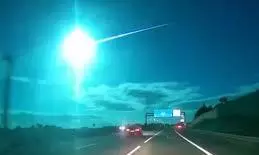
Blue meteor seen in Spain and Portugal, delights netizens
text_fieldsOn Saturday, a suspected giant meteorite in blue lit up the skies over Spain and Portugal, creating a spectacle captured by many on their mobile phones and shared widely on social media.
Meteors, which are space rocks and other materials that burn up as they enter Earth's atmosphere, leave bright streaks in the sky.
Multiple videos have emerged showing the meteor streaking across the night sky. In one video, recorded on a driver's dash-cam, a burst of blue light can be seen blazing across the sky. Another video captures the sky turning neon blue, leaving spectators awestruck.
An X user shared a video, exclaiming, "UNREAL!! MASSIVE Meteor sighting over Portugal! To see a streak like this is a once-in-a-lifetime event! No word on whether it hit Earth and became a Meteorite! Also seen for Hundreds of miles! Wow."
Another commenter noted, "Wow, this was impressive, so bright! From the colour it seems to be made of magnesium." A third user added, "Same month as the aurora borealis. Why are all these once-in-a-lifetime events happening so close to each other? Makes you wonder if the solar eclipse was a warning."
Early reports indicate that the blue flash was visible for hundreds of kilometres across the night sky. However, there has been no official confirmation of whether the meteorite reached the Earth's surface. Some reports suggest it might have fallen near the town of Castro Daire.
NASA explains that meteoroids, or "space rocks," range in size from dust grains to small asteroids. When these objects enter Earth's atmosphere at high speed and burn up, they are called meteors, often referred to as fireballs or shooting stars. NASA stated, "When meteoroids enter Earth's atmosphere (or that of another planet, like Mars) at high speed and burn up, the fireballs or 'shooting stars' are called meteors. Meteoroids, rocks in space, range in size from dust grains to small asteroids."























